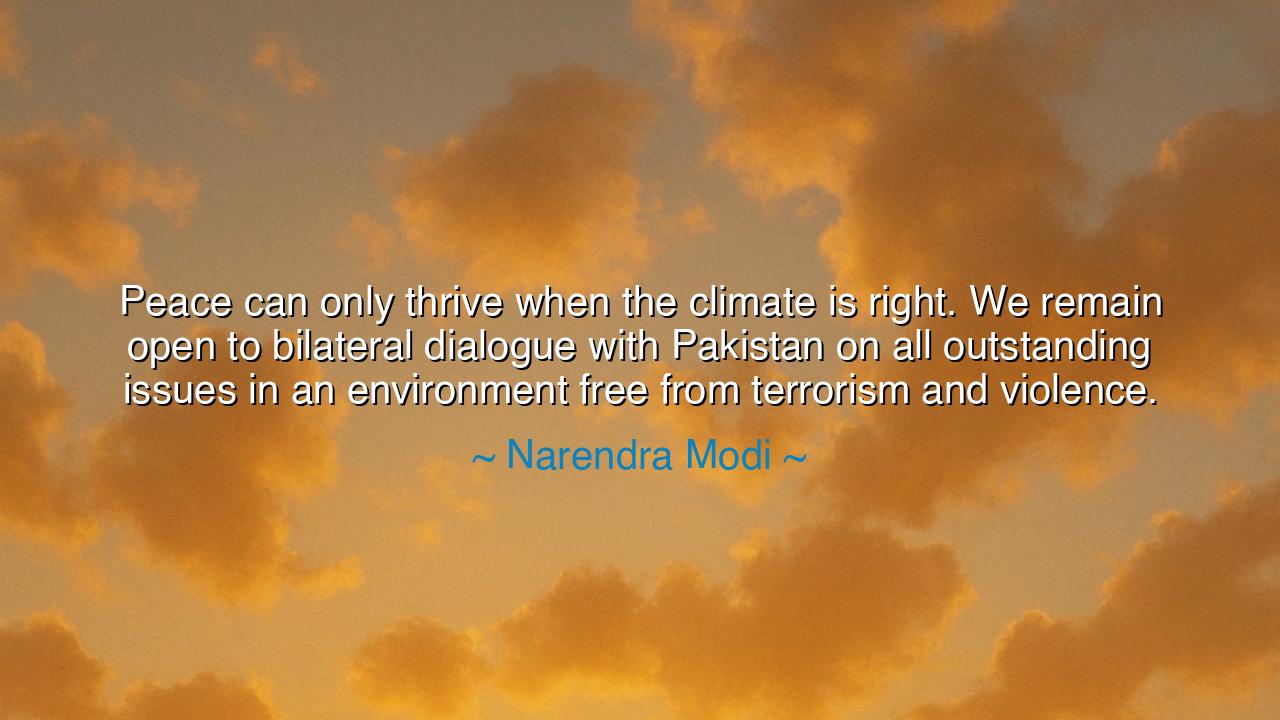
Peace can only thrive when the climate is right. We remain open
Peace can only thrive when the climate is right. We remain open to bilateral dialogue with Pakistan on all outstanding issues in an environment free from terrorism and violence.






The words of Narendra Modi—“Peace can only thrive when the climate is right. We remain open to bilateral dialogue with Pakistan on all outstanding issues in an environment free from terrorism and violence”—resound with the wisdom of one who understands both the fragility and the strength of nations. Here the Prime Minister speaks of peace not as a simple wish, but as a plant delicate in its growth, one that requires fertile soil, clear skies, and steady hands to nurture it. Without the right climate, even the noblest intentions wither; but when conditions are prepared with care, peace can take root and flourish.
The origin of this statement lies in the long and complex history between India and Pakistan, two nations bound by blood and soil, yet divided by borders, wars, and suspicion. For decades, efforts toward reconciliation have risen and fallen like tides. Modi’s words acknowledge this reality: dialogue is possible, but it must be honest and untainted by violence. To speak of peace while allowing terrorism to persist is to sow seeds in poisoned ground. His words declare a truth that transcends borders: peace cannot exist alongside the constant threat of destruction; it demands an atmosphere of trust and security.
History itself proves this principle. Consider the fragile peace of Europe after World War I. Treaties were signed, but the climate was not right: resentment festered, and seeds of hatred grew in the soil of unresolved conflict. That false peace collapsed into an even greater war. By contrast, after World War II, the victors built new institutions—the United Nations, NATO, the European Community—that created the conditions for trust, security, and shared prosperity. The climate was carefully tended, and in that soil, Europe has known its longest season of stability. Thus Modi’s insight reflects a lesson written in history’s ink: true peace demands more than words—it requires the right environment.
The meaning of Modi’s words is both pragmatic and profound. He calls for dialogue, yes, but dialogue that is not overshadowed by fear or stained by blood. In human terms, this is true in every relationship: reconciliation between brothers, neighbors, or nations cannot thrive if threats remain unchecked. Just as a seed cannot grow amidst stones, so too peace cannot thrive where violence reigns. His words, though rooted in geopolitics, speak to all human interactions: before there can be harmony, the soil must be cleared of poison.
Consider the example of Nelson Mandela in South Africa. For years, dialogue with the apartheid regime would have been meaningless, for the climate was soaked in oppression and brutality. Only when violence began to give way to reconciliation, and when both sides created the space for true dialogue, could peace emerge. Mandela understood, as Modi declares, that peace is not merely proclaimed—it must be prepared for. The hearts of men and the structures of nations must first be made ready.
The lesson here is clear: peace is never cheap. It is not a matter of signing papers or speaking noble words. It must be built on justice, on security, on the removal of the forces that corrupt trust. In our lives, as in nations, if we desire peace, we must labor first to create the climate—removing resentment, restraining anger, and rooting out all that would sabotage reconciliation. Only then can dialogue blossom into understanding, and understanding into true harmony.
Practically, this calls us to vigilance. For leaders, it means refusing to compromise with terror, but remaining open to dialogue once violence ceases. For individuals, it means addressing the barriers in our own hearts and relationships before seeking reconciliation. Ask yourself: is the climate right for peace? Have I removed bitterness? Have I confronted injustice? Only in such an environment can peace grow strong.
Thus, Modi’s words should be remembered not only as a statement of statecraft, but as timeless counsel: “Peace can only thrive when the climate is right.” Let every generation take heed, for this truth applies as much in the affairs of nations as it does in the conflicts of households and hearts. Prepare the ground, clear away the stones of hatred and fear, and in that space, plant the seeds of dialogue. Then, and only then, will peace rise like a tree that cannot be shaken by the storms of violence.






AAdministratorAdministrator
Welcome, honored guests. Please leave a comment, we will respond soon